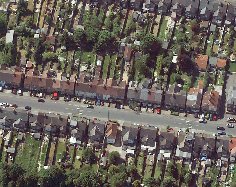UK local authority Slough Borough Council is set to become the first local authority in the UK to use thermal imaging to clamp down on people living illegally in outbuildings. It is not known exactly how many so-called “sheds with beds” there are in Slough, but estimates range from 700 to 3,000.
 The council has commissioned geographic imaging company Bluesky International to produce a thermal map of the town, which officers will use to pin-point warm areas in outbuildings. An aeroplane fitted with state-of-the-art aerial imaging cameras will fly over the whole borough to collect the data as soon as the conditions are right.
The council has commissioned geographic imaging company Bluesky International to produce a thermal map of the town, which officers will use to pin-point warm areas in outbuildings. An aeroplane fitted with state-of-the-art aerial imaging cameras will fly over the whole borough to collect the data as soon as the conditions are right.
Bluesky uses a new type of thermal camera specifically designed for airborne surveying. The heat loss surveys are flown at night but the sensor can be used in the day for other applications. The new generation thermal mapping system allows measurements from property roofs to be recorded with high precision to produce pinpoint accurate thermal maps showing the heat loss from individual properties including sheds being used as dwellings.
Ray Haslam, head of environmental services and resilience for Slough Borough Council, said: “Our primary concern is making sure people aren’t living in unsafe conditions, with little or no heating, or in places that do not comply with building or fire safety regulations.
“Aerial photography is one of a range of tactics we’re using to crack down on this problem and we hope evidence of heat in outbuildings will help us build a true picture of how many sheds are being lived in and where they are.
“We will be able to cross-check and see whether they have valid Energy Performance Certificates (EPCs) which are required by law for places where people live. If they don’t, we will be speaking to landlords and offering some advice and guidance, and enforcing the law if we need to.
“One option is to repeatedly fine a landlord for not having an EPC. The fine is £200 a day, making it very expensive for people to continue using the outbuilding.”
Forced demolition of sheds with beds, although an option for the council particularly if a property is unsafe, is often a lengthy, costly process.
Other options for enforcement action include returning sheds to their legal use, such as a garage or store room, and in some cases granting permission for them to be used as a home, meaning that landlords will then be required to pay council tax and ensure they are energy and fire compliant.
Cllr James Swindlehurst, deputy leader and commissioner for neighbourhoods and renewal, said: “The people living in them generate waste, they use council services and they have a cost to the council that isn’t being paid for by taxation. It causes pressure on parking and driveways and we get neighbourhood complaints about densely built gardens.
“Some of these buildings are perfectly habitable but others are not compliant and we will take action to amend their use or have them removed.”
Slough Borough Council is one of a handful of local authorities who have been granted extra money from the Government to help improve conditions in houses of multi occupancy (HMOs) and reduce the number of sheds being used as accommodation without permission.
The occupants of sheds in Slough are believed to be mostly single adults or childless couples with low incomes.
Long-term, it is hoped, the thermal imaging data will also used to improve energy efficiency in homes across the borough.